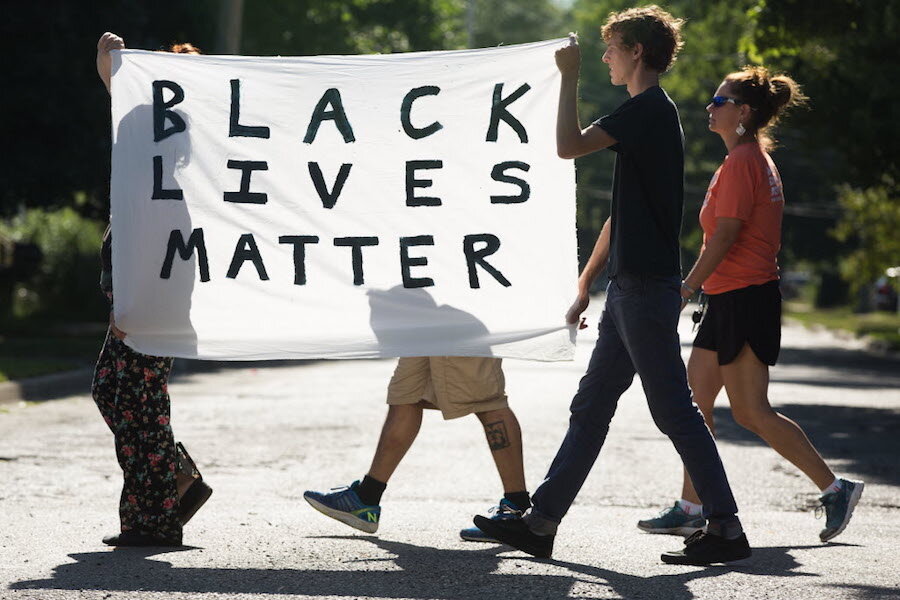Massachusetts mayor refuses police union request to hang ‘All Lives Matter’ banner
Loading...
Four years after the first #BlackLivesMatter appeared on Twitter, officers and activists, professors and students still seem to be arguing about what those three words mean. One side claims the hashtag denies the value of non-black lives, while the other uses it to raise awareness about the disproportionate injustice black people face.
Amidst angry chatter about the recent killings of two unarmed black men in one week by police officers and the assassinations of five police officers in Dallas and three in Baton Rouge, signs of unity have sprouted. Police and Black Lives Matter protesters shared a meal and danced together to build trust between the communities Sunday. Alton Sterling’s fifteen-year-old son, Cameron, urged the nation to “come together as one united family.”
Tension remains, however, between Black Lives Matter and police groups, and it largely centers around the phrase “Black lives matter.” A public conversation between Michael McGrath, president of the Somerville Police Employees Association, and Joseph Curtatone, mayor of Somerville, about the “Black Lives Matter” banner that has been hanging on City Hall since August 2015 captures the essence of the debate.
The “Black Lives Matter” banner “unfairly suggests culpability by [police officers] in the deaths at the center of the protest movement,” Mr. McGrath wrote in a letter to Mayor Curtatone Tuesday. He asked the mayor to replace the banner with one that reads “All Lives Matter.”
“The Somerville Police Employees Association fully endorses the proposition that black lives matter just as much as white, Asian, and Hispanic, and any other do,” McGrath wrote.
“Indeed, the removal of that banner and the placement of a banner stating ‘ALL LIVES MATTER’ would reflect appropriate concerns that police officers everywhere ... use deadly force only when necessary to protect the public or themselves from substantial harm.” McGrath wrote the replacement would also condemn the “reprehensible murder of innocent police officers.”
A banner honoring the slain officers was hung “at Somerville Police Headquarters where it would provide the most moral support to our officers,” Mayor Curtatone said in a statement Wednesday.
Curtatone emphasized that his support of police officers does not preempt the city’s “commitment to addressing systemic racism in our nation.”
“The City of Somerville stands against all violence and all injustice,” Curtatone said, and that is why both banners hang on government buildings.
“They should not put up any banner,” Ron Martinelli, author of “The Truth Behind the Black Lives Matter Movement and the War on Police,” tells The Christian Science Monitor in a phone interview. He questions the motives of Black Lives Matter activists, citing recent police shootings by those who used the hashtag.
Like all ideological movements, though, individuals have skewed the foundational principles of the group, supporters of the movement say.
“Black activists have raised the call for an end to violence, not an escalation of it,” wrote founders of the Black Lives Matter hashtag and movement – Patrisse Cullors, Opal Tometi, and Alicia Garza – in a statement on the recent police shootings.
“#BlackLivesMatter doesn’t mean your life isn’t important – it means that black lives, which are seen as without value within white supremacy, are important to your liberation,” wrote the three founders.
The only thing “All Lives Matter” accomplishes, they say, is the erasure of black voices.
Patricia Leary, a professor at Whittier Law School, recently wore a shirt that says “Black Lives Matter” to class. Afterward, she received a letter from students saying, “The statement you represented and endorsed is … highly offensive and extremely inflammatory.”
She responded by saying, “ ‘Black Lives Matter’ is not a statement about white people. It does not exclude white people. It does not accuse white people, unless you are a specific white person who perpetrates, endorses, or ignores violence against black people.”








